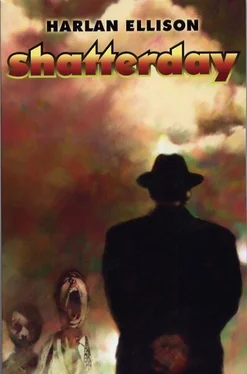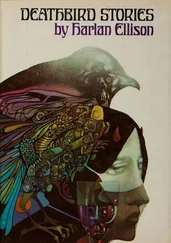There was a rumbling beneath her feet. The studio trembled with the reverberation of an impact in the earth. Through the sound-proofed walls came the dull roar of explosions. Tremblors rippled the floor, the vinyl tiles buckled around her feet.
The faint lights moved closer. Figures coming toward the glass. Stopping to stare in at her. Figures in long black garments, with drawn cowls that covered their faces. And strange, sickly purple light, the faintest, most terrible glow, shining out from beneath the cowls. They stared in at her. She could see no eyes: but they were staring in at her.
They raised their arms slightly, slowly, and the sleeves of their black robes fell back revealing their hands. Theresa found that she could not breathe, that her chest was convulsing with the pain of her wildly beating heart.
Their fingers did not end in flesh. Metal. Sharp, cold metal; thin and final. This was the answer to how phone calls from the same person could come from distant sources.
There was the sound of movement just outside the door of the studio. The walls shook with the echoes of the cataclysm outside. The roaring was louder now.
And in the moment before the door opened she had the final, petrifying thought that she had been part of it all, had spread the doctrine of irrationality and superstition every night for seven years, had given a platform to every demented True Believer whose wild fantasies might build her audience.
And now her worshipers had come to sacrifice their very own prophet. She felt cold and dead already, could feel the chill slice of the thin, metal fingertips. Her palms were soaked with sweat in expectation of the final performance.
The door opened and they filed in to fill the studio. They stood staring at her as she felt her life clog up in her throat and arteries. They raised their arms and the sleeves fell back from pale flesh and metal fingertips. She waited for the first touch.
And they sank to their knees, lifting their arms in supplication. She began to tremble with the rictus of a scream shaking her like a fever. Now she knew the worst, now she understood:
She was not to die. She had broadcast the word for them, every night for seven years, and she was not to die. She would be their dark priestess. Like the others who had done their spadework, like the others who had spread the word, she was to be kept alive, perhaps forever.
Dark priestess in a world of desolation, ruled by devils, cleansed of humanity. She would not die!
More ruinous than death: to rule forever in Hell. Lovelessly alive; worshiped by eaters of the darkness. To live on, coated always with a cold sweat, through a final performance that had no curtain, no exit lines.
Her scream could have shattered glass, but it didn’t; it merely resonated against the metal fingertips of her subjects, her masters.
From the burning world beyond the studio came the wind whisper of the plague of locusts.
Would You Do It for a Penny?
Introduction
Writers take tours in other people’s lives.
And every once in a while the observed becomes an integral part of the life of the observer. Make no mistake, and when the reviews are written and the idle chatter is passed—never permit the deletion: I did not write this story alone. It was a true collaboration between me and one of the most exemplary human beings I have ever known, Haskell Barkin.
We wrote this as a lark, a number of years ago, and it was published in Playboy. In that way, Huck—as we call him—helped me realize a secret desire. I had always wanted to see my work in Playboy but had been unsuccessful in getting them to consider the stories seriously enough. Not only because Playboy is arguably the highest-paying magazine market in the world, but because as times have changed and fiction has waned in importance for that journal, to be replaced by topical nonfiction, the pages allocated for fiction have diminished. They are always hot to publish Cheever or Updike or Le Carré (and with justification because they are excellent), but because those fiction pages are held so dear they are highly selective in whom they permit to occupy that space. Unless one has had a popular success, from which instant name-identification provides an added value for their table of contents, it is strictly the quality of the material that buys a writer the chance at that forum.
Despite my having sent Playboy virtually everything of what I considered first rank for many years, including stories that later won awards and became widely anthologized, I could never get the nod. On one occasion they rejected a story titled “Pretty Maggie Money-eyes” on the grounds that the female character was stronger than the male character. As I say, even at Playboy times have changed. But for many years I was on the outside looking in. And it galled me. On a low energy level, to be sure, but a burr under my saddle nonetheless.
Then one Sunday Huck stopped by with an idea for a story. He told it to me and suggested we write it together, because he’d never written short stories. “Horse puckey,” I said, eschewing harsh language. “Write it yourself, kiddo. It’s a terrific idea and you’ve got the stuff aplenty to write it properly. Never take two people to do a job one can do as well.” (This, from a man who has written an entire book of collaborations. Do I contradict myself? Very well, then I contradict myself. I am large, I contain multitudes. And while I’m about it, thanks Walt.)
You see, Huck has one of the great antic senses of humor in the civilized world. If anyone ever asked me to define droll, I’d schlep them over to Huck’s house and point at him. He is droll. So I was hardly being humble when I urged him to write the story himself. I was being logical: one hires an expert in matters vitreous when one requires an intricate job of glassblowing… not a window-washer.
The story-idea was a funny one.
And though I like to think many of my stories have an ample dollop of humor in them, droll is one of the many things I ain’t.
So Huck went off and a while later he came back with a story of maybe half a dozen pages. I read them, and the skeleton was there, but it hadn’t really been fleshed out. So I said, “Well, maybe we can make this a little better. Leave it with me, if you like, and I’ll run it through the typewriter again.”
Huck opined that would be peachykeen, and I shoved the story into a pending file till I had a little free time.
Ten thousand years later (to hear Barkin tell it), I got around to unshipping the manuscript, reread it, and did a final draft. I gave it to Huck to read, and he sat there laughing not at all. That’s his way. Droll, yes; effusive, forget it. When he got finished I thought he’d tell me it was ka-ka. Instead, he smiled and said, “It’s terrific; very funny.” Go figure it.
So we sent it out to the late A. C. Spectorsky of Playboy, with a recommendation kindly added by Ted Sturgeon, who was high in favor at Playboy at the time. And a few weeks later they bought it. My first sale to Playboy, a secret dream actualized through the direct involvement in my life of Huck Barkin.
Why is he telling us all this?
I tell you all this because writers take tours in other people’s lives and the dearest treasure one finds, second in importance only to wisdom and insight, is friendship. I write of friendship frequently. Oh, most of the time you may not recognize it, because I have it dressed up in outrageous garb, but that’s one of the most important things in life, as I see it, and I try to examine it as closely as love or courage or the mortal dreads… real friendship. Elsewhere in these pages you’ll find a very long tale about friendship called “All the Lies That Are My Life,” and though this story isn’t about friendship, it came into being because of friendship.
Читать дальше












